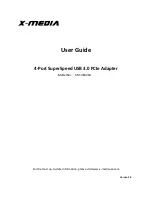
To change the nPartition behavior when an OS is shut down and halted, use either the
acpiconfig enable softpowerdown
EFI Shell command or the
acpiconfig disable
softpowerdown
command, and then reset the nPartition to make the ACPI configuration
change take effect.
—
acpiconfig enable softpowerdown
When set on HP rx7620, rx7640, rx8620, and rx8640
servers,
acpiconfig enable softpowerdown
causes nPartition hardware to be
powered off when the OS issues a shutdown for reconfiguration command (for example,
shutdown -h
or
shutdown /s
).
This is the normal behavior on HP rx7620, rx7640, rx8620, and rx8640 servers with a
windows
ACPI configuration setting.
When softpowerdown is enabled on HP rx7620, rx7640, rx8620, and rx8640 servers, if
one nPartition is defined in the server, then halting the OS powers off the server cabinet,
including all cells and I/O chassis. On HP rx7620, rx7640, rx8620, and rx8640 servers
with multiple nPartitions, halting the OS from an nPartition with softpowerdown
enabled causes only the resources on the local nPartition to be powered off.
To power on hardware that has been powered off, use the
PE
command at the
management processor Command Menu.
—
acpiconfig disable softpowerdown
When set on HP rx7620, rx7640, rx8620, and rx8640
servers,
acpiconfig disable softpowerdown
causes nPartition cells to remain
at a boot-is-blocked state when the OS issues a shutdown for reconfiguration command
(for example,
shutdown -h
or
shutdown /s
). In this case, an OS shutdown for
reconfiguration makes the nPartition inactive.
This is the normal behavior on HP rx7620, rx7640, rx8620, and rx8640 servers with an
ACPI configuration setting of
default
.
To make an inactive nPartition active, use the management processor
BO
command to
boot the nPartition past the boot-is-blocked state.
•
Boot Modes on HP Integrity nPartitions: nPars and vPars Modes
On cell-based HP Integrity
servers, each nPartition can be configured in either of two boot modes:
—
nPars
Boot Mode
In
nPars
boot mode, an nPartition is configured to boot any single operating system
in the standard environment. When an nPartition is in
nPars
boot mode, it cannot boot
the vPars monitor and therefore does not support HP-UX virtual partitions.
—
vPars
Boot Mode
In
vPars
boot mode, an nPartition is configured to boot into the vPars environment.
When an nPartition is in
vPars
boot mode, it can only boot the vPars monitor and
therefore it only supports HP-UX virtual partitions and it does not support booting HP
OpenVMS I64, Microsoft Windows, or other operating systems. On an nPartition in
vPars
boot mode, HP-UX can boot only within a virtual partition (from the vPars
monitor) and cannot boot as a standalone, single operating system in the nPartition.
CAUTION:
An nPartition on an HP Integrity server cannot boot HP-UX virtual partitions
when in
nPars
boot mode. Likewise, an nPartition on an HP Integrity server cannot boot
an operating system outside of a virtual partition when in
vPars
boot mode.
To display or set the boot mode for an nPartition on a cell-based HP Integrity server, use
any of the following tools as appropriate. Refer to Installing and Managing HP-UX Virtual
Partitions (vPars), Sixth Edition, for details, examples, and restrictions.
System Boot Configuration Options
93
Summary of Contents for Integrity rx7640
Page 8: ...8 ...
Page 12: ...12 ...
Page 13: ...List of Examples 4 1 Single User HP UX Boot 101 7 1 Single User HP UX Boot 181 13 ...
Page 14: ...14 ...
Page 42: ...42 ...
Page 88: ...88 ...
Page 130: ...Figure 5 8 Core I O Button Locations OLR MP Reset 130 Server Troubleshooting ...
Page 140: ...140 ...
Page 176: ...176 ...
Page 184: ...184 ...
Page 191: ...Figure C 3 Planning Grid Computer Room Layout Plan 191 ...
















































